What are we going to do?

Richmond, Va. | The International Mission Board is moving forward with its plan to release 600-800 missionaries and staff by the start of 2016 by appointing a transition team to assist with the process. In the meantime, other SBC leaders continue to urge financial support for the mission board to lessen the impact of necessary budget cuts.


A pattern of deficit spending over a five-year period, relying on reserve funds and the sale of properties abroad, resulted in the announcement by new IMB President David Platt that missionary positions would be cut in order to balance the budget.
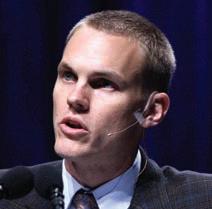
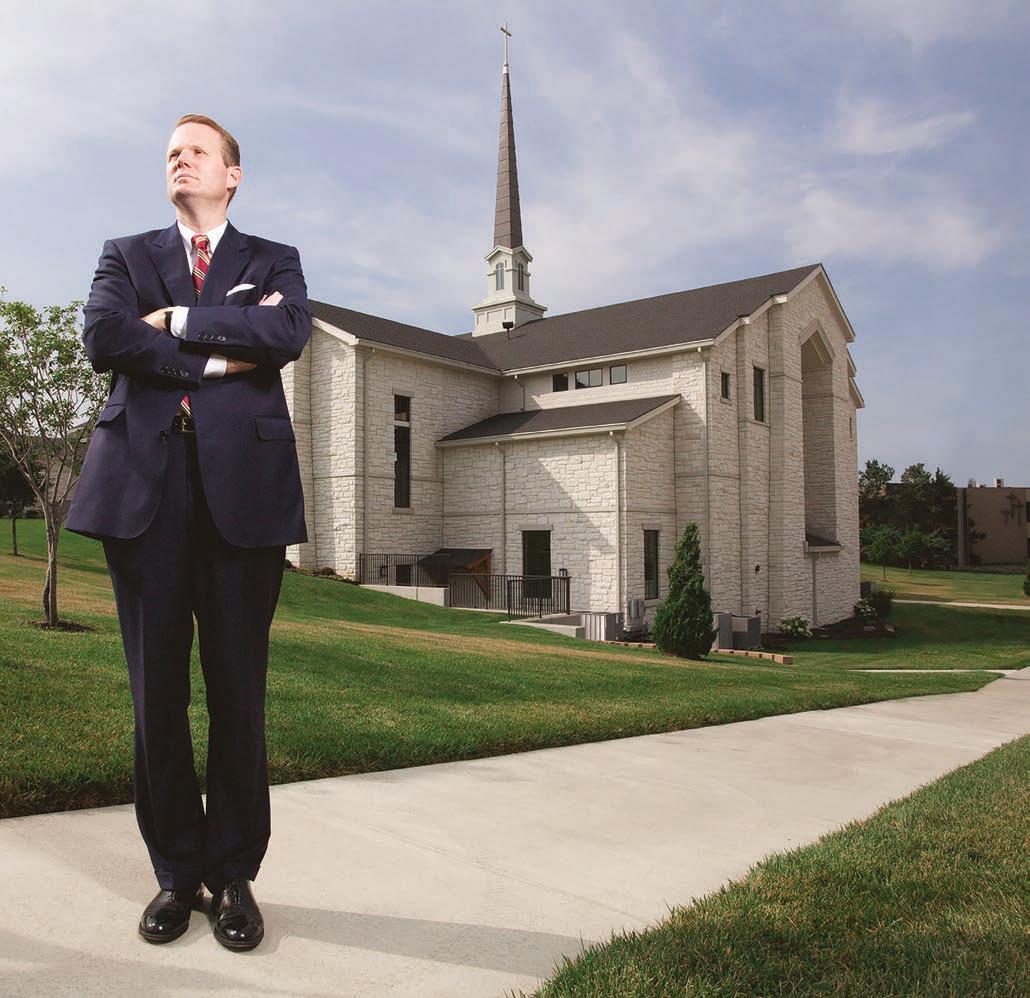

“The aggregate amount—$210 million—was a bit of a surprise to us,” CEO of the SBC Executive Committee Frank Page said in a phone call with 300 large-church pastors last week.






missions funding Leaders
CP
Illinois Baptist DISASTER RELIEF East Coast floods P. 8 LEADERSHIP Mixed messages from the Pope Reporter’s Notebook P. 8 PRAYER Why I keep holy conversations simple Cheryl Dorsey P. 12 Fresh. Fast. Free. Get news and commentary online. See page 3 for addresses. Nonprofit Organization U.S. POSTAGE PAID Peoria, Illinois Permit No. 325
see
as IMB solution
cuts P. 2 OCTOBER 12, 2015 Vol. 109 No. 14 News journal of the Illinois Baptist State Association in focus Forward Thinking IBSA Annual Meeting UP ON THE ROOF P. 7
Nate Adams on IMB
A REPORT FROM KANSAS CITY P. 6 Jason Allen on SBC in the 21st Century Midwestern Seminary’s convenes thinkers “Build Your Kingdom Here” November 11-12 SCHEDULES AND MORE SPECIAL SECTION B P. 3 PLATT
CONVENTIONAL WISDOM
Snapshots from the world of Illinois Baptists
“Whether one believes this decline of ‘Christian America’ calls for a time of lament, or presents great opportunity (or both) for the church, one cannot help but accept the changing landscape... Across the U.S., cities in every state are becoming more post-Christian – some at a faster rate than others.”
– David Kinnaman, Barna
culture: The top 15 “post-Christian” cities
San Francisco, CA 66%
Albany, NY 66%
Boston, MA 65%
Burlington, VT 64%
Providence, RI 60%
Portland, ME 60%
New York, NY 59%
Las Vegas, NV 59%
Hartford, CT 57%
Buffalo, NY 57%
Tucson, AZ 56%
Seattle, WA 56%
Fort Myers, FL 56%
Chicago, IL 54%
Los Angeles, CA 54% Champaign,
Population who are Post-Christian based on faith/beliefs.
the cooperative program
Giving by IBSA churches as of 10/02/15
– Barna Research
$4,514,900
Budget Goal: $4,800,000
Received to date in 2014: $4,588,069
2015 Goal: $6.2 Million
The Illinois Baptist staff
Editor - Eric Reed

Managing Editor - Meredith Flynn
Contributing Editor - Lisa Sergent
Graphic Designer - Kris Kell
Administrative Assistant - Andrea Hammond

Intern - Morgan Jackson
For questions about subscriptions, articles, or upcoming events, contact the Illinois Baptist at (217) 391-3110 or IllinoisBaptist@IBSA.org
The Illinois Baptist is seeking news from IBSA churches. E-mail us at IllinoisBaptist@IBSA.org to tell us about special events and new ministry staff.


POSTMASTER: The Illinois Baptist is owned and published every three weeks by the Illinois Baptist State Association, 3085 Stevenson Drive, Springfield, Illinois 62703-4440. Subscriptions are free to Illinois Baptists. Subscribe online at IBSA.org
NATE ADAMS
What are we going to do?
Vividly I remember my Dad talking about the final hours he spent with his mother, my grandma, in the hospital before she died. As she came to the end of her life, and was only semi-conscious, Grandma would occasionally rise up in her bed and say, “What are we going to do? What are we going to do? What are we going to do?”
Dad said she would relax back into her pillow with these words: “I guess we’ll just trust the Lord.”
For devoted Southern Baptists, recent news from the International Mission Board that as many as 600 to 800 missionaries soon need to return from the mission field leads us to that same, urgent question: What are we going to do?
I submit that trusting the Lord is still the best and right answer. Let me suggest five specific ways we here Illinois can do that.
First, we should pray. We should intercede for those in leadership at IMB as they make decisions, and for those missionaries and others who are affected by those decisions. We should pray for solutions, for generosity from givers and churches, and for the Lord to send laborers into the harvest fields, even as it seems the opposite may be happening.
Second, we should trust the IMB trustees and executive staff to do their jobs. More than once over the years I have thought to myself that I would do things differently if I were in charge of some organization. Sometimes time proves me right, and sometimes time proves me wrong. But in our autonomous, cooperative family of churches we elect trustees to give oversight to the gifted and called leaders of our entities. They are closer to the facts, finances, and circumstances than any of us. And the Bible says that one of the ways we trust the Lord is to trust the leaders he providentially allows to have positions of authority.
Third, we should renew and increase our churches’ commitment to missions through the Cooperative Program. Even the surges and higher levels of giving to the Lottie Moon Christmas Offering over the past decade have apparently not been enough to prevent this downsizing of the missionary force. But 10% giving through the Cooperative Program would have.
Nationally, CP giving from SBC churches has dropped from an average of 10% in 1989 to 5.5% in 2014 (6.8% here in Illinois). If churches’ CP giving had continued to average at least 10% over those years, the number of international missionaries would have grown dramatically, along with the rest of our cooperative missions and ministries.
Fourth, we should of course consider giving our most generous gifts ever through the Lottie Moon Christmas Offering. IMB says that will not change the need for many of the missionaries to return home. But it may speed the rate at which they can be replaced.
And finally, as churches, associations, state conventions, and individual Christians, we should look for ways to directly assist the missionaries who will be returning stateside. Temporary housing, transportation, job placement, and personal encouragement will all be needed by returning missionary families. IBSA will be establishing a Missionary Relief Fund, and the offering received at this year’s IBSA Annual Meeting will be designated for that fund. I will also be contacting IMB with a list of IBSA’s currently open positions.
Many of us were surprised at the need for these missionaries to return home. But God is not. And so let us answer that urgent question with one or all of these very tangible actions that demonstrate we are trusting the Lord.
Nate Adams is executive director of the Illinois Baptist State Association. Respond to his column at IllinoisBaptist@IBSA.org.
2 IBSA. org Illinois Baptist
News that up to 800 missionaries may soon return from the field leads us to ask this urgent question.
1
Spfld., Decatur
Quad Cities 42% St. Louis, MO 41% Harrisburg, Mt. Vernon 34% 2 3 4 5 6 7 8 9 10 11 12 13 14 15 56 57 58 80 Chicago may be
%behind. 100%
42%
a new addition to the top 15, but the rest of Illinois isn’t too far
from the front
Attack touches SBC family
A 26-year-old man who killed nine and injured many others at an Oregon community college reportedly targeted Christians in the attack, said a Southern Baptist pastor whose granddaughter was shot and survived.
“The shooter asked a question, ‘Are you a Christian?’ And if they said yes, he said, ‘Good, because you’re going to see God in a second,’ and he shot them. My granddaughter hid and got a bullet through the leg,” Howard A. Johnson, founding pastor of Bethany Bible Fellowship (SBC) in Roseburg, told Baptist Press. “That’s pretty traumatic.”
COUNTING THE COST — In August, the International Mission Board announced a plan to cut missionary personnel and agency staff by 600-800 people, citing budgetary shortfalls. Currently, approximately 4,800 missionaries serve in places like Lesotho (above), baptizing new believers and starting new churches. IMB photo
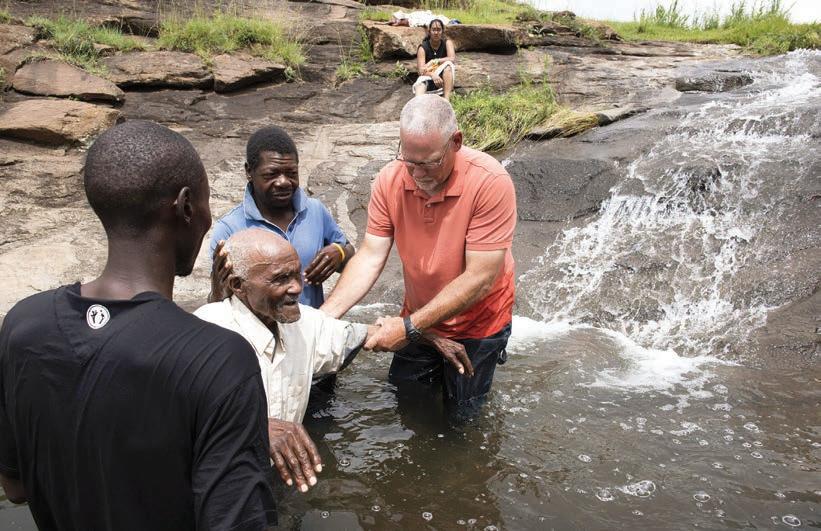
Continued from page 1
“We were both astounded, no doubt about it,” SBC President Ronnie Floyd said of himself and Page.
Pointing to a long-term solution, both men urged to increase giving through exisiting channels, rather than special offerings. “We see this as an ongoing issue—systemic—and the way we do that is through Cooperative Program giving,” Page said.

“Our number one challenge is to finance the work of the Great Commission,” Floyd said. “The only way to make it up consistently is through CP,” he said, echoing Page. Floyd’s Arkansas congregation recently gave its first $1-million gift through CP, and in the conference call he urged fellow pastors to “do more.” “We can find a way to do more. Everybody, under God, can find a way to do more.”
During his tenure, Page has challenged Southern Baptists to give 1% more to CP, and his efforts are bearing fruit. The SBC ended its fiscal year Sept. 30 $1.1 million over its 2014–2015 budgeted goal and $2.5 million over the previous year’s CP receipts.
Gifts to the Lottie Moon Christmas Offering for International Missions, which go directly to the IMB, reached an all-time high in 2013 at $154 million. Last year giving was at $153 million. But many leaders have urged churches to focus on CP giving, which supports all Southern Baptist work, in the spirit of “a rising tide lifts all ships.”
Meanwhile, a buy-out offer has been extended to IMB personnel. The transition team will focus on the practical needs of returning missionaries.
Clyde Meador, IMB’s executive advisor to the president, is leading the transition team. He noted most members of the team have significant field experience and have made the adjustment from international service to life in the U.S.
Meador said Southern Baptists already are responding with assistance. IMB has received offers of housing, employment opportunities, vehicles, counseling and other practical expressions of support from individuals, churches, associations, state conventions, WMU, seminaries and other partners.
On the call to pastors, Floyd and Page expressed support for Platt and the IMB trustees going forward. “I think we can trust our leadership,” Page said.
Others, such as Wanda Lee, National WMU executive director have been blunter.




“We can lament the churches that haven’t given, we can lament many things,” Lee said.
“But one thing we have failed to do in our churches is to embrace the missions assignment of helping our children and our youth understand God’s field.”
Reporting by Illinois Baptist staff, Baptist Press, and IMB


ERLC goes to the dogs…

The Ethics and Religious Liberty Commission of the SBC released the “Evangelical Statement on Responsible Care for Animals” Sept. 30. “Our treatment of animals is a spiritual issue,” said ERLC President Russell Moore. “The Bible is clear that our being created in the image of God does not lessen our responsibility to steward the physical world well, but heightens it. This statement is a reminder that the gospel transforms our use and care of animals as we see all of God’s glory reflected in his good creation.” To read the statement, go to EveryLivingThing.com.
Freedom concerns grow
More Americans believe religious freedom is worse today than 10 years ago (up from 33% in 2012 to 41%).
The greatest increase is among Gen-Xers (29% to 42%) and Boomers (38% to 46%). Among Millennials 34% expressed growing concern, up from 25% in 2012.

IBSA. org 3 October 12, 2015 NEWS The Ticker facebook.com/illinoisBaptist twitter.com/illinoisBaptist pinterest.com/illinoisBaptist vimeo.com/IBSA www.IBSA.org www.ib2news.org Follow the latest Illinois Baptist news
– Baptist Press, ERLC, Barna Group
OREGON the briefing
Banner year for new churches Streator Camp spruced up
Springfield | Thirty churches have applied for affiliation with the Illinois Baptist State Association in 2015— more than three times the number that applied last year. Messengers to the IBSA Annual Meeting next month will hear a report from the Association’s Credentials Committee on the churches recommended for affiliation.
A large number of the churches that applied are church plants, said IBSA’s Van Kicklighter, associate executive director for the Church Planting team. Planters “are interested in being part of an organization or family that is seeking to impact lostness and push back the darkness in a state that needs to hear the message of Jesus.”
He added that the church plants on the list of newly affiliating churches mirror the diversity of Illinois: “Korean, African American, African, Spanish-speaking, Southeast Asian peoples, urban core, suburban, rural and open country…all of these mission fields are represented in this year’s class of affiliating churches.”
The IBSA Annual Meeting is Nov. 11-12 at First Baptist Church in Marion. The churches affiliating with IBSA will be introduced at the beginning of the Wednesday evening session.
Churches applying for affiliation
Agape Bible Fellowship, Matteson
August Gate, O’Fallon
Korean Bethel, Mt. Prospect
Bethel, St. Charles
Bridge, Lebanon
Calvary A.D., East St. Louis
Calvary International, Bolingbrook
First Congregational, Kewanee
Freedom, Rockford
Good Seed Ministries, Chicago
Hinsdale Chinese, Clarendon Hills
Iglesia Bautista Latina, Effingham
Iglesia Bautista Piedra Angular, North Aurora
Karen Church, Wheaton
Mars Hills, Chicago
New Beginnings, Chicago
New City Church, Chicago
New Hope, Rock Falls
Park Avenue, Peoria
Real Church, Chicago
Redemption, Johnson City
Rock n Roll Church of Southern Illinois, Herrin
Sojourn Church, Belleville
Starting Point Community Church, Chicago
Tensae Church, Wheaton
The Source Church, Plainfield
The Journey, Metro East, Belleville
The Journey, Southern Illinois, Marion
University, Charleston
World Deliverance Christian Center, Hillside
Hope for more use of northern facility
Streator | A group of Campers on Mission dedicated a week in September to tackling a list of repair jobs at Streator Baptist Camp— one of IBSA’s two retreat facilities. The team of 25 volunteers rebuilt the lake dock, built a canoe holder, replaced concrete, cleaned, did electrical work, and completed other small projects.
During their daily devotion time one evening at a local restaurant, the group even led a waitress to Christ after she stopped to listen. A lot of work was done that week— physically and spiritually, said Campers on Mission chaplain Jan Kragness.
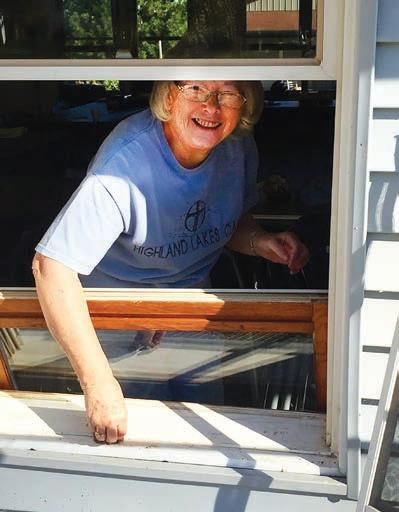
Once in the spring and once in the fall, a Campers group spends a week at IBSA’s two camp facilities making repairs and improvements, and “probably saving us thousands of dollars,” said Mark Emerson, associate executive director for the Church Resources team.
“This group can go in with a bunch of folks who know a lot of things...they’re given a punch list of all [the camp’s] needs and can start knocking them out one by one,” he said, “and make it better.”
However, only about 3% of IBSA churches (fewer than 30) made use of Streator Camp for their events in the past year. Children’s camp this summer accounted for half the use of the facility. In addition to that, just a few northern associations and churches used the Streator facility.
By comparison, IBSA’s southern camp at Lake Sallateeska hosted more than 5,000 people from 335 churches and local associations at camps, retreats, and weekend events.
“We would really like to see more IBSA churches host events at Streator,” said Emerson, who oversees the camps. “We’re happy to host other groups as well, but the camp was established primarily to serve IBSA churches.”
Each of the camps has its own attractions.
Emerson says Streator Camp’s location is an asset for churches from Springfield to Chicago. So are its natural assets.
Kids can fish at both locations, but “I sometimes don’t have kids catch fish at Lake Sallateeska,” Emerson said. They do at the Streator pond. The pond is good for swimming, too, he said. And the worship chapel at Streator has been updated more recently.
Streator also is a place pastors can go for a personal prayer retreat, absolutely free.
Campers on Mission are among those making sure the Streator facility is ready for winter. Kragness expressed COM’s heartfelt concern for the churches in northern Illinois and their desire to give young people in urban churches a comfortable and affordable rural setting for retreat and enrichment.
A lot of work was accomplished that week, “and there’s still much more to go,” she said, “but we are praying about seeing a lot of things done there still.”

4 IBSA. org Illinois Baptist IBSA Annual Meeting
ONE WEEK, HARD LABOR — Campers on Mission Cliff Waller, Leroy Burnett, Gary Watson, and Sonny McKenzie were part of a team of 25 volunteers who gave a week in September to winterize Streator Baptist Camp ahead of the cold weather. Short breaks were ideal for lunch, devotions, or in this case, a photo op. Below, Judy Barnes cleans a window in the dining hall.
Students of the world
Kids missions conference focuses on Bangladesh
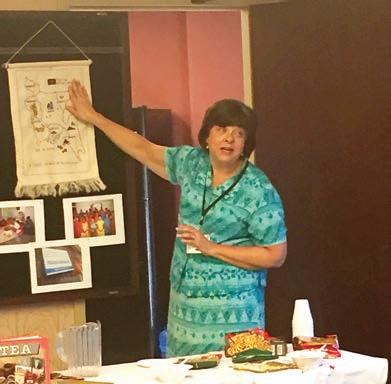
Springfield | Southeast Asia came to Central Illinois October 2-3, and more than 200 kids and their leaders got a crash course in missions from people with first-hand knowledge of the region.

The newly named Children’s Missions Celebration focused on Bangladesh this year, and featured a missionary couple currently serving in the region. Illinois Director of Missions John Baker and his wife, Cindy, (pictured, right), who formerly served with the International Mission Board in the region, also were on hand to share with kids about the sites, sounds and smells of Southeast Asia.
As one young participant put it: “I got to see a real live missionary. Now I know that they’re real.”
“Isn’t that cool?” said IBSA’s Barb Troeger, who helped coordinate the annual missions event with the Church Resources team. “How many times do you really get to meet a missionary?”
The audience for this year’s Children’s Missions Celebration was more than twice that of last year’s event, due in part to a wider audience. The October conference was previously known as GA Day and Girls’ Missions Celebration, but this year’s co-ed gathering opened the door for churches to send more kids.
Paul Reynolds, a volunteer kids ministry worker at First Baptist Church, Herrin, said his church has sent groups to the girls’ conference and to RA Congress events for boys. This year, their group of nine kids traveled to Springfield to learn together about missions in Bangladesh.
Reynolds said the event is valuable because it raises awareness of what missions really is, and gives kids an understanding of what life looks like in other parts of the world. “I think in a lot of ways it’s an eye opener to them to how good we have it here.”
The celebration even had its own mascot: Bangle the Tiger was a hit with kids who posed for photos with her. (Robin Kicklighter, wife of Church Planting Associate Executive Director Van Kicklighter, donned the tiger suit.)
The focus on Bangladesh arose from a growing relationship with Southern Baptist workers in the area, and others in the States who have a heart for the country. Kimberly Sowell, an author and speaker, shared with women at last spring’s Priority meeting about Light of Hope Learning Center, a job training initiative that seeks to prevent human trafficking.
Amy and Amanda Neibel from FBC Carmi went to Bangladesh this year for training at the center, and a fellow church member, Niece Edwards, is scheduled to go in March along with IBSA’s Carmen Halsey. Illinois volunteers will be furthering the work of International Mission Board missionaries.
Next month’s AWSOM event for young women also will focus on Bangladesh. For more information about missions opportunities for kids, teens and adults, go to www. IBSA.org/missions.
Transgender issue at rural Illinois school
File this under “Yes, it can happen here.”
Parents of students at a high school in the village of Moweaqua, Illinois, population 1,831, met with school district officials to discuss their concerns regarding a female student, who identifies as male, using the boys’ restroom and locker room.

The Oct. 1 meeting, billed as a roundtable discussion, was instead a presentation led by Central A&M District 21 Superintendent DeAnn Heck. According to WAND-TV, “Heck took charge and said set the ground rules: no student’s names would be mentioned, there would be no opinions and no choosing sides.” The district told parents “what transgender students’ rights are in Illinois and what could happen to schools that don’t follow them.” The report did not say how the district was accommodating the student.
The Illinois Human Rights Act states it is illegal to discriminate on the basis of gender identity.
Rainbow Doritos aid LBGT
Frito-Lay, the parent company of Doritos, has introduced rainbow-colored chips in support of the LBGT non-profit group “It Gets Better.” But you won’t see the colorful Cool Ranch chips in stores. They are only available through a $10 donation to the charity.

Embattled Kentucky clerk meets Pope
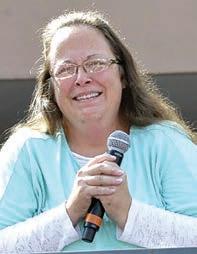
Pope Francis’s visit to the U.S. included a visit with Kim Davis, the Rowan, Kentucky county clerk who spent time in jail for refusing to issue marriage certificates to all couples to avoid showing support for same-sex marriage. Davis took the stand because of her Christian beliefs. The private meeting was not announced until after the Pope had left for Rome. After the meeting was reported, Vatican officials backed away from any official support of her actions. However, the Pope did express to reporters on the flight back to the Vatican his support for religious liberty.
– WAND-TV, Liberty Counsel, NY Daily News, Townhall.com, U.S. News
online, posted every Tuesday at www.ib2news.org.
IBSA. org 5 October 12, 2015 Get breaking news in The Briefing
culture
EMBRACING GLOBAL MINISTRY — These girls are two of more than 200 children who participated in the Children’s Mission Celebration at the IBSA Building in October. Attendance was up as the former GA Day went co-ed.
IN FOCUS
Sage Advice
Leaders identify key issues for the SBC in the 21st century
BY ERIC REED
Jason Allen is the youngest by far of the group he has called together. And in this gathering of seminary presidents and convention leaders, there is a sense that a passing of the baton is happening before our eyes. In fact, that is one topic Allen has asked his illustrious guests to address in this symposium on “The SBC in the 21st Century.”
Their reports will be gathered and published in a book for wider distribution, but for now—at this late September gathering on the campus of Midwestern Baptist Theological Seminary—the task is to listen and learn what their listy observations hold in common.
Midwestern Seminary’s “miraculous transformation” is not the subject of this meeting, although most every speaker references it in his opening remarks. They speak of Allen’s impact, engendering confidence in a once-struggling institution. They take note of the new chapel that rises above a green slope at the entrance to the Kansas City campus. The building in a clean prairie style was completed just as Allen assumed the presidency of the school two years ago. A couple of speakers reference the rise in enrollment. And there’s some discussion of the just-announced $7-million gift to build a much-needed student center and dining complex.
Among the notables here is an unnamed presence, Charles Spurgeon, the famous 19th century British preacher and evangelist. Midwestern recently acquired much of Spurgeon’s personal library collection and has converted the former chapel space to house it. There’s a lot of informal conversation about Spurgeon. Most attenders take the tour.
But amid obvious historical footings and with the insight of SBC heads, the subject is the future. At 38, fresh in his seminary presidency, Allen draws experienced leaders and thinkers to look forward— and tell us what they see.
“
I respectfully request that we refuse to be held hostage by the present, but be freed to a robust future for gospel advance.
– Ronnie Floyd, SBC President
DECISION TIME – “We will become more unified about missions, or fragment around generational differences,” said Midwestern Baptist Theological Seminary President Jason Allen
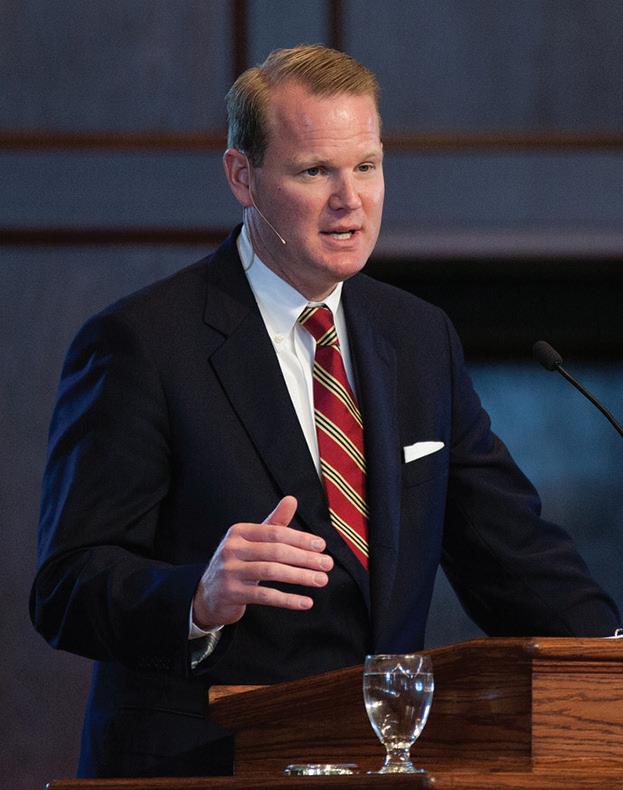
Who are we now?
Many questions about Baptist identity seem to have been answered in the past 30 years. Starting with the Conservative Resurgence in 1979, Southern Baptists have affirmed biblical inerrancy and ended a lean toward mainline Protestant liberalism. That shift also ended whatever tendency Southern Baptists would have had toward cultural accommodation. We aren’t mainline or mainstream, and as the culture moves farther left, we don’t want to be.
We know who we aren’t, but who are we?
The more recent issue for Southern Baptists is that of Reformed theology: Just how Calvinistic are we. Trinity University President David Dockery calls Southern Baptists “modified Calvinists” because we are not consistent in all five points.
Three of our seminaries are more strongly Reformed, products and by-products of Al Mohler’s 22-year presidency at The Southern Baptist Theological Seminary. At this conference, only Paige Patterson, President of Southwestern Baptist Theological Seminary, was clearly not Calvinist. He raised the issue of evangelistic zeal,
I am concerned about many things, but not overly concerned. Handwringing is inappropriate for Christians.
– Paige Patterson, SWTBS President
and questioned whether the growth of Calvinist adherents will cool the baptismal waters further.
“Evangelism will have to be reestablished as the majority of the Great Commission,” Patterson said. He criticized church planting that does not produce new believers. Talking about the gospel is as far removed from effective witnessing as talking about race cars is from driving in NASCAR, Patterson said in a pithy list of analogies.
The more current “ecclesial crisis” is that of regenerate church membership. In the quest to reach seekers and postmoderns and millennials, church membership has been devalued, and more specifically, the certainty that people who join our churches are in fact believers in Christ as evidenced by baptism.
Confessional conviction
Will Southern Baptists embrace an identity that is more theological than tribal?” Mohler asked in his list of “10 unavoidable questions.”
The sages are almost uniform in their desire for Southern Baptists to have stronger theology and firmer confessional expressions of those beliefs. Too many people are members of SBC churches because it’s the family church, their friends go there, or they like the music—not because they hold strongly to the church’s theology.
Not to devalue our “tribal identity,” Mohler said, but “the tribe is not enough.” Tribalism—this informal gathering based on traditions and relationships—will give way to cultural accommodation, he warned, whereas confessional conviction will give believers (and thereby the denomination) theological moorings to withstand societal pressures to surrender to sexual redefinitions and moral decline.
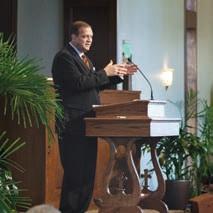
Mohler asked whether today’s generation will “summon the courage” to face these issues which will require of them vigilance.
The current era is one of warm evangelicalism whose backbone is softening, to summarize several speakers. That makes this “the Baptist moment” according to Mohler. Among evangelicals, Baptists are best positioned to give the issues of “late modernity” a solid biblical, theological response.
Generational handoff
The discussion among panelists on “passing the baton” was playful at points with elder Patterson describing youthful Allen as “a man not yet dry
Continued on page 7
”
Will Southern Baptists produce a generation of pastors and theologians up to the challenge of late modernity—not mere pastors or theologians, but both?
– Al Mohler, SBTS President
6 IBSA. org Illinois Baptist
the ears.” At another time Patterson, turning, 73 this month, commented, “I came on the scene right after Polycarp was martyred.” (That’s 155 A.D.) In these moments, it’s clear the baton is passing.
Mohler framed the handoff this way: “We have to ensure that there is healthy, courageous generational transition” in such a way that there is a Southern Baptist Convention in the future.
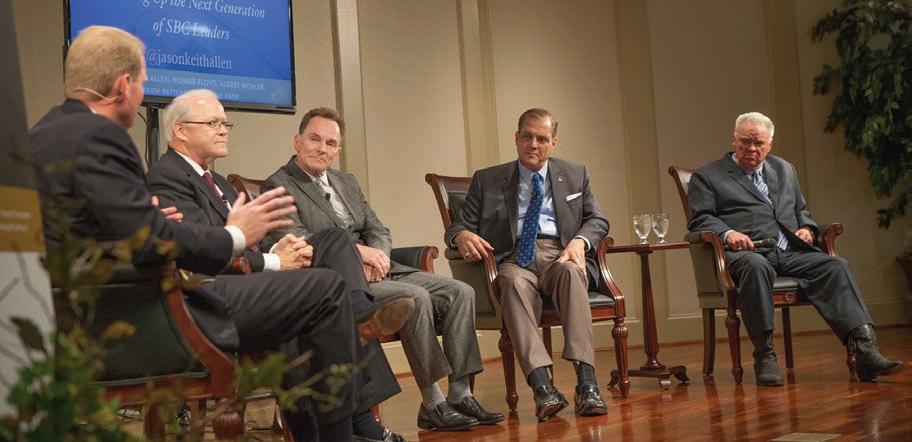

For Dockery, the handoff is more than from one generation to the next. It must be intergenerational. “Most Southern Baptists (and most Americans) do not find our identity in generations; our identity is in Christ.” Dockery says the handoff is also international and global, given the growth of evangelicalism in Africa and Asia.
Collaborative ministry
In a time when there is much discussion about “cooperation” as a denominational distinctive, SBC Executive Committee CEO Frank Page injected a new term, one that may have more weight with Millennials. “Collaborative ministry is biblical,” Page said. And for a generation accustomed to frequent electronic communication on every aspect of daily life, “collaborative” may be an easier sell than “cooperative.”
Cooperation indicates compliance with a mindset and participation in a program, whereas collaboration implies partnership and full participation by all parties involved.
As a denomination comprised mostly of smaller congregations, collaborative ministry “gives everyone a seat at the table,” Page said, including the SBC’s over 10,000 ethnic churches. But there’s education to be done. And it’s not only younger leaders who need the crash course. “We find there is a lack of understanding among ethnic churches of collaborative missions,” Page said.
But it was Dockery who pointed out that while the SBC has made strides in righting the sin of prejudice (the “one stain” on our record, he said), greater effort is required to bring minorities into leadership.
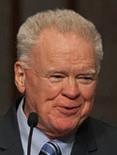

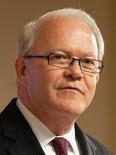
What about associations?
“This is no time to fly solo in the culture,” SBC President Ronnie Floyd said, “and no time for a church to fly alone.” Floyd’s presentation had the same listy character of the other speeches, but as a pastor, his list was most practical.

Floyd in particular called for a reduction in duplication (“and triplication”) of ministries and services by local, state, and national entities.
Larger state conventions, especially in the South, often offer their own versions of education, mis-
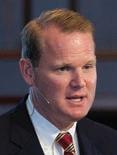
The Sages
‘Spurgeon’s rail’
Consider it the first see-through pulpit. A century before the plexiglass lectern, blackmetal music stand, or repurposed pub table, there was Spurgeon’s rail.
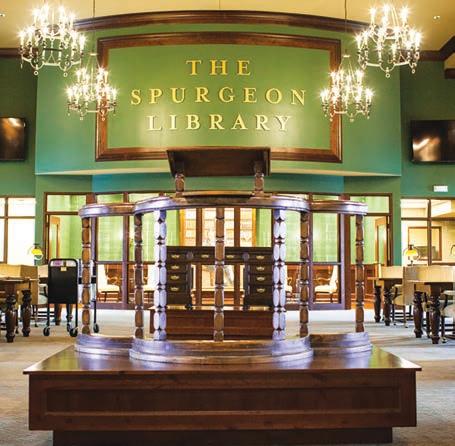
The centerpiece of the great Metropolitan Tabernacle in London was not an ornate pulpit. It was a rail, a simple wooden banister with only newel posts at the corners and topped by a little shelf just big enough for a Bible and his one-page manuscript. Behind it, in some photos there is a small trestle-style library table. With the open “rail” extending out about eight feet, there was plenty of room for the preacher to pace about without toppling off the platform.
The historic podium anchors the new Spurgeon Library at Midwestern Baptist Theological Seminary, along with a collection of 5,103 of the great master’s books and commentaries from his pastoral office. Overhead hang large new paintings depicting the great preacher’s call and ministry. (We also saw Spurgeon’s doorknob and the silver keyhole cover from his study door, recently acquired.)
sions, and church planting; but since the implementation of the Great Commission Resurgence five years ago, those conventions have shifted funds to the national SBC in an effort to more effectively share the gospel in “new work” or frontier areas. And state convention staffs have been reduced by one-third, from 1,750 nationally to 1,350.
Making the denomination leaner is part of the thrust toward more effective collaboration. Floyd raised the issue of mergers, naming the International Mission Board and North American Mission Board as one possibility.
Local associations are another example where “regionalization” may make the SBC more effective. It’s a question that should be answered “honestly and boldly,” Floyd said, rather than trying to “preserve our old wineskins.”
“How can we leverage where we are and what we have and who we are to reach forward in a unprecedented manner” to advance the gospel?
I wanted to stand behind Spurgeon’s rail and preach a bit in the style of the renowned orator, but I don’t know what Spurgeon sounded like. He died in 1892 at age 57. Although Edison had invented sound recording more than a decade earlier, there are no phonograph discs of Spurgeon preaching. His son and successor Thomas recited a transcript of his father’s last sermon, but Thomas’s voice is tinny on the wax cylinder, and we are left to wonder how the man who once preached to an audience of 23,654 without a microphone really sounded.
But his words—we have many. Up to 25 million words are documented in 63 volumes of his sermons from his 38-year pastorate. A Midwestern professor is leading the transcription and exposition of recently discovered sermons from Spurgeon’s earliest years in the pulpit. (No small feat that is, as we also saw from pages of sermon notes in his own scritchy Victorian hand.) So the number grows.
While he did speak to some of the ills of his day (American editors sometimes deleted his strong comments on slavery), Spurgeon always made a beeline for the cross. If Spurgeon railed, it was for Christ.
“When I cease to preach salvation by faith in Jesus,” Spurgeon said, “put me into a lunatic asylum, for you may be sure that my mind is gone.”
We need more of Spurgeon’s rail today.
– Eric Reed
IBSA. org 7 October 12, 2015 PAGE
FLOYD MOHLER
DOCKERY ALLEN
PATTERSON
NEXT GENERATION – Midwestern’s Jason Allen (left) leads a discussion on developing younger leaders with SBC Executive Committee CEO Frank Page, SBC President Ronnie Floyd, Southern Seminary President Al Mohler, and Southwestern Seminary President Paige Patterson All photos courtesy Midwestern Baptist Theological Seminary behind
Disaster Relief
‘Marathon’ recovery predicted
Baptists ready after East Coast flooding
Greenville, S.C. | A South Carolina Baptist Disaster Relief official is predicting it will take years for the state to recover from the extensive flooding of early October.

“This is much bigger than [the recovery from] Hurricane Hugo,” said Randy Creamer, Disaster Relief coordinator for the South Carolina Baptist Convention. Creamer said the flooding that has prompted 10 counties or municipalities to declare states of emergency has caused more widespread damage than did Hurricane Hugo, which slammed into the state’s coastline in September 1989.
Creamer said the recovery will be “a marathon, not a 100-yard dash.”
South Carolina disaster relief volunteers set up a feeding operation on Oct. 5 in Richland County, one of the state’s hardest-hit areas, to provide meals for first responders and workers from the county and the City of Columbia.
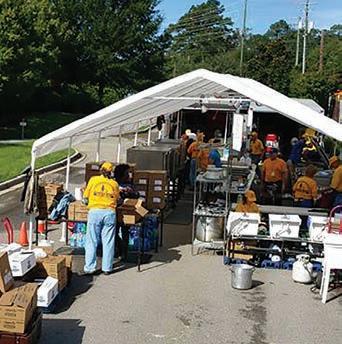
In an Oct. 6 e-mail, Scott Vaughn, who is acting as SC Disaster Relief media response, shared, “Currently, feeding units are serving first responders and hospital volunteers. Damage assessors, chaplains and trained mud-out volunteers are being gathered in Columbia. The sun is out to-
day, water is beginning to recede, and the real cleanup will begin over weeks and months. Pray for first responders and the National Guard as they will likely discover grave circumstances in homes and vehicles. Pray for government officials, including civil engineers, who work to restore drinking water to the City of Columbia, and give assessment to roads, bridges, and earthen dams.”
As the response efforts began, Mickey Caison, interim executive director for the North American Mission Board’s (NAMB) Southern Baptist Disaster Relief (SBDR), and other leaders worked on solving logistical issues. “The major problem is the large number of roads and bridges that are washed out,” Caison said. “As soon as possible, we will be moving equipment and volunteers into the affected areas. Please be in prayer for those affected, as well as Disaster Relief leaders and volunteers as we bring help, healing and hope.”
IBSA State Disaster Relief Coordinator Rex Alexander said Illinois volunteers are ready to work if called upon. “We are monitoring the needs in South Carolina. If our national Disaster Relief leadership requests assistance from IBSA volunteers, we will
Views on Francis’s visit
“That’s why so many people are attracted to Pope Francis, who would otherwise be repelled by the teachings of his church and would oppose them publicly. It’s because evidently you can like Pope Francis, because he doesn’t particularly represent any kind of defense of those teachings that cause such offense.”
– Southern Seminary President Albert S. Mohler, “The Briefing”
“Within a few centuries, the pope has gone from anti-Christ to ‘brother in Christ’ for a lot of Protestants.”
– LifeWay Research President Ed Stetzer, on a survey that found 63% of Protestant pastors “view Pope Francis as a genuine Christian and your brother in Christ”

“Francis discourages conservative Catholics, more by silence than anything else. He encourages progressives, both by his silences and his affirmations.”
– R.R. Reno, firstthings.com
ON THE SCENE – South Carolina Disaster
be ready to respond.”
At least nine South Carolinians died in flooding caused by a slow-moving rainstorm that began Oct. 2. Some parts of the state saw more than 20 inches of rain. Hundreds of stranded people had to be rescued from flooded homes and buildings. Statewide, nearly 400 roads and 150 bridges were closed.
Those wishing to donate to SBDR can call IBSA at (217) 786-
2600 or visit donations.namb.net/ dr-donations. Designate checks for “Disaster Relief.”
Compiled from Baptist Press and Illinois Baptist staff reports.
reporter’s notebook
Feel-good pope’s mixed messages
As Pope Francis hugged a disabled child, MSNBC’s Chris Matthews said, “What power this man has to make people feel good.” And it’s true. Even I, with all my Baptist objections to the papacy, got a catch in my throat at that scene on the Philadelphia airport tarmac when Francis stopped the car and got out to bless the child in the wheelchair. Yes, he makes people feel good.
Why else would millions line the streets for an eight-second glimpse of the pontiff waving from the back seat as his tiny Fiat passed by?
But CBS’s Jericka Duncan, to bishops at a press conference following the Philadelphia visit, was more pointed: Why didn’t Francis publicly tell people how he feels about the family, starting with the marriage of one man and one woman?
Francis has a history of making statements that, broadly interpreted, could make homosexuals, divorced people, those who allow for abortion, and even “women religious” believe there’s an open door for them in mainstream Catholic life and leadership. But Francis isn’t going to change his church’s doctrines on marriage, protection of the unborn, a male only priesthood. He can’t: 2,000 years of church history, conservative Catholics in the global south, and the College of Cardinals won’t let him.
So why make gestures that soothe postmoderns and liberal Americans, but don’t really change anything? Perhaps because, as Chris Matthews puts it, he wants people to feel good.
But that isn’t speaking the truth in love. Sure, Francis’s approach is long on love. Don’t we all see Christ exemplified in his embrace of the homeless and handicapped? But the more loving response to people struggling with sin and its effects is to tell the truth: We love you, but the church can’t embrace your beliefs when they are outside orthodoxy. That’s the lesson I’m taking from Francis’s visit.
Church leaders do no favors when we let people think some doctrinal issues are open for debate when they’re really not. I have witnessed this accommodation of feelings in conversations with non-Baptists and Millennial evangelicals pressured by the current wave of cultural liberalization. (“Why can’t my brother marry his boyfriend?” “You won’t accept my sister’s application for lead pastor?” No, sorry.)
We want to approach these conversations in love, but they must be grounded in truth. Letting people think what they want because we’d rather not hurt their feelings isn’t being loving—or honest. Love is grounded in truth, not feelings.
8 IBSA. org Illinois Baptist
– DER
sound off
Relief volunteers were quick to respond to a statewide flood in October that breached a levee (above) at the Columbia Riverfront Canal. A Disaster Relief team (right) sets up a feeding station. U.S. Air National Guard, SCDR Facebook
Is it Baptist to be multi-site?
BY NATHAN CARTER
You are probably familiar with the term “multi-site” by now. Maybe your church has already gone to the model, or is considering it. Very simply put, multisite refers to the concept of one church that meets in multiple locations. Twenty-five years ago, there were fewer than 25 such multi-site churches in North America. Today there are over 5,000! It is a relatively recent phenomenon, yet an increasingly popular strategy for reaching more people with the gospel.
Opening up another campus allows for growth that is usually quicker and more cost-effective than building bigger or sending people out to start something new. It is in many ways simpler and more streamlined. You don’t have to reinvent the wheel, but can keep the same name, logo, website, 501(c)3 status, support staff, etc. Resources can be shared more readily. You can be more certain that your own “DNA” is being replicated.
I understand the appeal and practical benefits. There are many Baptists whom I respect that have gladly joined the multi-site movement, motivated by a genuine desire to penetrate lostness. But I’ve always had a lingering doubt about whether this method is entirely consistent with our Baptist principles, particularly that of local church autonomy.
Now you may be wondering why I don’t pose the question as, “Is it biblical to be multi-site?” It is because I don’t have space to make a full argument from Scripture. I am assuming that we are all Baptists here. And I am assuming that we are Baptists because we believe it is biblical. We are solidly convinced the Bible teaches that baptism is to be administered to believers only. And we believe that “a New Testament church of the Lord Jesus Christ is an autonomous local congregation of baptized believers” (The Baptist Faith & Message 2000, Article VI). Our views about credobaptism and congregational ecclesiology are the principal reasons why we are Baptist, and not Methodist or Presbyterian.
But while they may remain firm on the practice of baptism, Baptist practitioners of the multisite model appear willing to
compromise the autonomy of the local assembly. Each distinct location is not allowed the responsibility to receive and dismiss its own pastors and members. There is limited leeway given to determine the best programs and strategies for evangelism and discipleship. In many ways, the satellite congregations are bound by the decisions coming out of central headquarters.
When it comes to organizational structure and leadership in a multi-site operation, there may be one single pastor over all the campuses, in which case you have a hierarchy. How is this different than having a bishop? Or there might be a representative group of elders overseeing all the campuses, in which case you then have a presbytery. It seems to me that while the language
may be “one church in multiple locations,” what you really have is a small denomination.
There are potential dangers in any system, but with multi-site, the pull towards empire-building and a cult of personality is extremely strong. There is also a temptation to trust in a franchise brand instead of the power of the Word and Spirit.
I can see how in true revival circumstances where massive amounts of people are being converted at once, a temporary multi-site solution might be needed. But I would rather see this as church planting in slow motion.
What all this means is that the task of pastors is not just to do the work of an evangelist (2 Tim. 4:5), but also to commit what we know to faithful men who will be able to teach others also (2 Tim. 2:2). We must be committed to raising up leaders from within our churches who could do what we do and be released from our authority to start other churches as the need arises. Hopefully these churches would retain a similarity and organic connection, without control or formal structural unity.
A growing number of likeminded yet independent congregations freely choosing to associate and cooperate together in mission…that sounds more Baptist (and biblical) to me. Nathan Carter is pastor of Immanuel Baptist Church in Chicago.

Pat’s Playbook
Communicating cooperation

QThe new guy on our Finance Committee wants to cut the percentage we send to Cooperative Program. He says there are better ways to spend money than “supporting the denomination.” What would you say?
ABecause he is new, he may not understand the missional purpose behind the Cooperative Program. Take time to explain and train the entire committee about an Acts 1:8 missions strategy. Remind them that just as God has promised to bless the tithes and sacrificial gifts of individuals, he also blesses the sacrificial missions gifts of the church.
While the CP allocation may appear to be a large amount of the budget, the committee needs to understand how it is used within their own association, state, across North America, and around the world. Together churches can accomplish more than they can individually!
Stress that Cooperative Program giving is not “paying dues” or a “membership fee” to be Southern Baptist; it’s the year-round support of thousands of missionary families serving the Lord and sharing the gospel. Rather than cut the budget, consider challenging the committee to increase CP giving by 1%!
Keep them focused
Our church has ADD. We skip from one emphasis to another and never seem to complete a project.
A Q
Many churches spend time looking for a magic formula to make them a healthy, growing, joyful congregation. They’re always ready to implement the next, newest thing. Ask your pastor to meet, and discuss your concerns with him. As a member, be ready to cite examples of unfinished projects. Encourage your church to adopt two or three major ministry projects for the entire year, and stay focused on those until they’re completed. Your IBSA Zone Consultant or the Church Resources Team can assist you in this area. Contact us at (217) 786-2600.
Pat Pajak has pastored churches of all sizes across Illinois. He presently leads IBSA’s Church Consulting team. Send your coaching questions for Pat to IllinoisBaptist@ IBSA.org.

IBSA. org 9 October 12, 2015
devoPAT PAJAK
table talk
“The hacker who stole the church’s offering information says he’s really sorry this amount is actually ten percent of my annual income.”
I understand the appeal and practical benefits, but what about local church autonomy?
‘Changers’ live up to name
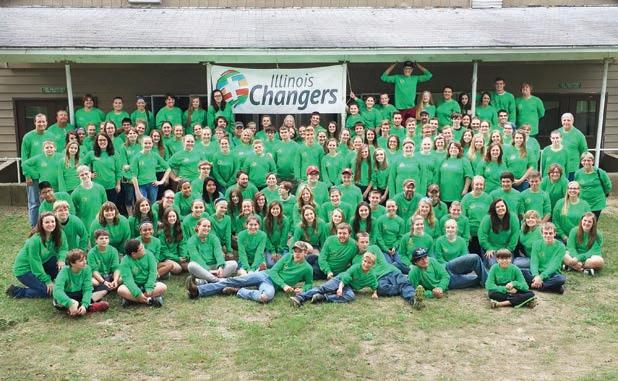
in THE ZONE
Meet: Sylvan Knobloch

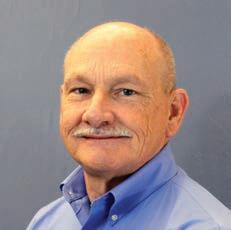 Zone Consultant
Zone Consultant
Zone: 3 (East Central and Three Rivers Associations)

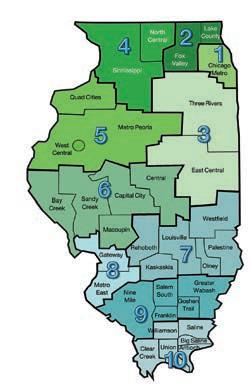
Other current roles: IBSA’s Director of Church Leadership Development
Birthplace: Red Bud, Illinois
Family: Sylvan and his wife, Kathryn, have two children, a son-in-law and daughter-in-law, and four grandchildren.
Years in Illinois: 36
Other places you’ve served here: Baptist Campus Minister, East ern Illinois University in Charleston; Man ager of BSU Cen ter at Southern Illinois University in Carbondale
What makes your zone unique?
Zone 3 includes urban and rural churches that are composed of large congre gations with multiple staff members, as well as smaller congregations. The churches are ethnically diverse. Two major state universities and Christian universities give churches in the zone a unique opportunity to reach Millennials.
Favorite restaurants in your zone: rQ Barbecue (Shorewood), Einstein Bros. Bagels (Champaign-Urbana), and Silvercreek (Urbana)
IBSA zone consultants work with directors of missions and churches across the state. www.IBSA.org/zone
NeTworkiNg
September weekend, 152 students from 15 churches tackled work projects at Lake Sallateeska Baptist Camp as part of their Illinois Changers experience. They tore the roof off the Inn, painted four buildings, repaired and painted picnic tables, built a dock, and generally spruced up the area.
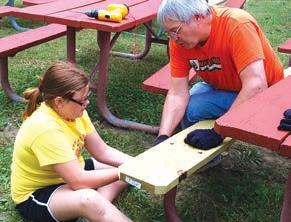



CHURCHES
Welcome
Brad Swartz joined University Baptist Church in Charleston as lead pastor. Before moving to Charleston, Swartz and his wife, Cristy, lived in Cleveland, Ohio, where he served as an associate pastor at a local church. Pastor Swartz graduated from The Southern Baptist Theological Seminary with a Master of Divinity.
Anniversary
Fairview Baptist Church in Creal Springs celebrated their 135th anniversary on Sunday, Sept. 13. The congregation reflected on past achievements and a brief history of their church.
Members shared testimonies and then turned their attention to the future and what they believe God is going to do through Fairview. Music was brought by the Phelps brothers, a quartet celebrating their 60th year singing together, and IBSA executive director Nate Adams spoke and presented the church with a plaque commemorating the anniversary. “It was just a great day,” said pastor Ken Sharp.
Good news
Marshall Missionary Baptist Church has experienced great growth in recent months. The church averaged 140 worshipers on Sunday mornings, but started seeing around 150-160 people during the summer, “which is crazy for us,” said Pastor Paul Cooper. Then, building on their summer boost, attendance is now reaching 180. “God is moving,” Cooper said. “We now desperately need the space. Please pray we sell our current building and can get into our new building ASAP!”
Zeigler First Baptist Church is seeking a part-time pastor. Resumes may be sent to Pastor Search Committee, First Baptist Church, 106 S. Pine St., Zeigler, IL 62999. E-mail resumes may be sent to Leuna Bagwell at fbzsecretary@mchsi.com.
State Park Baptist Church is seeking a bivocational pastor. Contact Tommy French at (618) 345-1961 for more information, or send resumes to State Park Baptist Church, 3220 Harvard Plaza, Collinsville, IL 62234.
PAID ADVERTISEMENT
Salem Baptist Church, Florissant, Missouri, is seeking a bivocational/ full-time pastor, in agreement with Baptist Faith and Message. Prefer pastoral experience, some seminary. Contact Pastor Search Committee at Salem Baptist Church, 19715 Old Jamestown Road, Florissant, MO, 63034-1125 or e-mail georgetripp09@ gmail.com.
Colona Baptist Church reports effective outreach to their community through a weeknight dinner. On a recent Wednesday, the church served 90 meals at their “Faith-n-Food Bible Study,” and Pastor Rod Stalsberg reports 12-15 new attenders at Sunday services as a result. “When you were helping us through our difficult time last October,” he told zone consultant John Mattingly, “we were averaging four people on Wednesday night, including the pastor.” What a difference a year makes.
Find more information on ministry positions at IBSA.org/connect Send NetworkiNg items to AndreaHammond@IBSA.org
10 IBSA. org Illinois Baptist
IF I HAD A HAMMER – On a balmy
EVENTS
October 23-24
Children’s
Ministry
Resource Conference

featuring 2015 VBS Preview
What: Become familiar with children’s ministry resources and learn how to start a children’s ministry. Churches with existing programs will be challenged to make their ministries even more effective.
Where: IBSA Building, Springfield and Pleasant Hill BC, Mt. Vernon Register: www.IBSA.org/kids
Contact: CathyWaters@IBSA.org
november 2
Plant St. Louis
What: Meeting to plan and implement strategy to start churches in the St. Louis area

Where: St. Louis
Contact: CharlesCampbell@IBSA.org
November 4
Plant Chicago
What: Meeting to plan and implement strategy to start churches in the Chicago area


Where: Chicago
Contact: DennisConner@IBSA.org
November 6-7
AWSOM Conference
What: AWSOM (Amazing Women Serving Our Maker) is a conference for girls in grades 7-12.
Where: IBSA Building, Springfield
Contact: BarbTroeger@IBSA.org
November 10-11
IBSA Pastors’ Conference
What: Preaching conference for pastors
Where: Marion First Baptist Information: www.IBSA.org/PC2015
November 11-12
IBSA Annual Meeting
What: The 109th IBSA Annual Meeting will feature the annual sermon by Bob Dickerson, pastor, Marion First Baptist.
Where: Marion First Baptist Information: www.IBSA.org/IBSA2015
Contact: SandyBarnard@IBSA.org
November 11
Minsters’ Wives Luncheon
What: Conference and luncheon for all ministers’ wives
Where: Marion First Baptist
Contact: Judy Taylor, (618) 499-0069
November 13-14
Equipped
What: Leadership development for children’s missions leaders
Where: Lake Sallateeska Baptist Camp, Pinckneyville Register: www.IBSA.org/Kids
Contact: BarbTroeger@IBSA.org
November 29-December 6
Week of Prayer for Lottie Moon Christmas Offering
What: Missions offering for international missions Information: www.IMB.org
dave says
The best medicine
QI’ve worked in a hospital as a nurse for 10 years. I make good money working long hours. The problem is that it seems to disappear, and I’m left trying to stretch those last few dollars to the end of the month. I know I eat out a lot. I grab quick meals between shifts and on the way home because I’m too tired to cook. I think I spend more than I should on other things, too. Do you have any tips for someone who wants to get control of their money, but has very little free time?
ASometimes the medicine that works the best tastes the worst. This is true for both physical and financial health. That’s why, no matter how tired you are or how little free time you seem to have, you must make time to do a written budget every month. This is essential, and it really doesn’t take long. When you sit down and commit a plan to paper, giving every dollar a name before the month begins, you’re taking control of your money instead of allowing a lack of it to control you.
time, you’ll have more ability to do what’s needed with what you’ve earned. It’s empowering and energizing, and it gives you the chance to make your Total Money Makeover a reality
Money and behavior
QWhy do you say that personal finance is 80% behavior? I thought money was more about math and keeping track of things.
DAVE RAMSEY
Start with the income you know is predictable. If this isn’t possible, look back over the last several months and find the minimum amount you brought home during a month over that period of time. This will be the basis for your budget. Once you’ve established a baseline income, you can prioritize expenses. But remember, restaurants are not a priority!
When you start telling your money what to do ahead of
AKeeping your checkbook balanced and things like that are an important part of what I teach. However, behavior plays an even bigger role for several reasons. You can add, subtract, multiply and divide all day. That stuff’s easy. But until you learn to control your behavior, stick to a budget and spend less than you make, you’re always going to have problems with money. One of the keys to being a success in personal finance is realizing work comes before play. This is a behavior issue. Let’s say your car needs new brakes. You know this, and you know you have a limited amount of cash, but you still walk into a store and buy a big, fancy television instead. That is not mature behavior. As long as you behave that way, your money will always slide right out of your hands.
And this means you’ll never have enough for important things like saving, investing and giving.
Financial advisor Dave Ramsey is a prolific author and radio host.

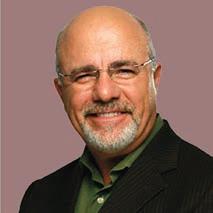
IBSA. org 11 October 12, 2015
Learn how to use technology for outreach as well as uniting believers in corporate worship. Learn how to create an attitude of worship at your church from the bulletin to the preaching. Church Technology Conference February 20 IBSA Building, Springfield 9 a.m. - 2 p.m. For more information on the Summit or to register go to IBSA.org/Summit, e-mail BarbTroeger@IBSA.org or call (217) 391-3138. Illinois Leadership Summit January 26-27, 2016 For information: www.IBSA.org | (217) 391-3124 | CathyWaters@IBSA.org.
i lead
On-site with insight
ne of my most profound prayerwalks took place with a pair of 7-year-olds. On that Saturday, everyone had paired up for the half-hour walk through our community of 500 homes, leaving me with my son, Joseph, and a friend’s grandson, Antoine.
We began to walk three blocks around the church. I launched into a powerful prayer: “Lord, let your salvation come to this house! Send your power, Father. Change hearts, O God!” When I paused to allow the babies to get a word in edgewise, I heard this:
“Lord, help this little boy to help his mommy clean the front yard.“
Church needed here...
Location: Northwest Peoria, Peoria County
Target: Families moving into recently developed subdivisions

Characteristics: Metro Peoria, and the growth of the city is extending toward the mostly white collar, college-educated communities.
Prayer needs: For churches and believers to intercede with missional prayer and activity.
CHERYL DORSEY
And another saying, “Jesus, please give the little boy in this house a new Big Wheel because his is broken.”
And then, “Jesus, help them get these beer bottles out of the yard. They shouldn’t be drinking, Lord! Help them to stop.”
Even though I was towering over my partners, I felt seven inches tall. The Holy Spirit used Joseph and Antoine to teach me to pray “on-site with insight.” My partners prayed for practical and immediate needs.
Now, here’s what prayerwalking looks like for us:
Meet up. Start with 15 minutes at the church. Distribute prayer guides, go over prayerwalking basics, and point everyone to a Scripture that will set the stage for the next hour.
Send out. We send pray-ers out from the church in two’s and three’s, instructing them to go as far as they can and be back in half an hour. As they go, we urge them to pray with God’s insight and not their own.
Lift up. Pray as prompted by the things you encounter. Our prayers should feel conversational, low-key, but powered from on high. If folks down the street can hear us, we’re doing it wrong.
Take turns. Each person takes a turn praying in short paragraphs, not soliloquies. I liken it to making a prayer quilt—everyone brings a piece.
As we encounter people, we introduce ourselves and ask if they have any prayer needs. If they say yes, we ask permission to pray right there. Report in. Once everyone is back at the church, we take 15 minutes to report, a scribe records the headlines. The Lord reveals his awesomeness as we see a theme emerge.
Cheryl Dorsey is a prayer coordinator and pastor’s wife at Beacon Hill Missionary Baptist Church in Chicago Heights.
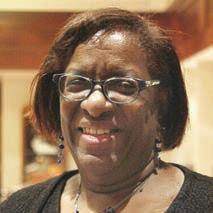
The percentage of Americans who qualify as “Post-Christian” has increased from 37% in 2013 to 44% in 2015. But what exactly does this term mean? Pollster George Barna names 15 characteristics. To name a few, Post-Christians:
• Do not believe in God
• Have never made a commitment to Jesus
• Disagree that the Bible is accurate
• Agree that Jesus committed sins
• Do not feel a responsibility to “share their faith”
Chicago has moved into the top 15. Even in places where people have usually identified as Christian in one way or another, such as Southern Illinois, the number is rising. Check out page 2 to see where your city ranks.
 – Barna.org
– Barna.org
inspirations
pinterest.com/illinoisBaptist

Connect with new neighbors
Most real estate websites have a “Recently Sold” tab. Enter your neighborhood’s zip code to see what houses have new families moving in soon.
Welcome them to the neighborhood with a card or small gift. And deliver it in person! Notes are great, but don’t neglect putting a friendly face with a name.
• Give them some helpful information about living in your neighborhood – the nearest parks, houses with other kids, etc.
• Give them information about your church –the location, service times, ways to get involved, and ministries for children.

• Don’t be a stranger. Make an effort to continue getting to know them – inviting the family over for dinner or setting up a play date for your kids.
The King’s Presence
“By faith Moses...chose to suffer with the people of God rather than to enjoy the short-lived pleasure of sin...since his attention was on the reward” (Hebrews 11:24-26, HCSB).
I was deeply saddened to read of the suicide of a pastor whose name became public as an account holder on the Ashley Madison website that had been hacked. I remember a good friend and colleague in ministry who lost his family, church, and ministry because of a moral failure.
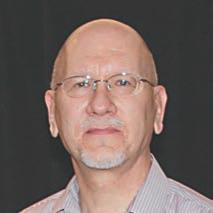
Most of us will not have our sins put on display, but we are all sinners. God knows our actions and our hearts. As disciples of Jesus we are called to a life of holiness. Satan prowls like a roaring lion and seeks to destroy. Don’t be fooled. Sin doesn’t present itself as something unattractive and harmful. Rather, it shows up dressed in alluring fashion that appeals to all our senses.
Once more, I am alarmed and alert because of what has happened. Moses’ example reveals two actions that I need to daily pursue. I must choose the direction I want my life to go (“with the people of God”) and I must concentrate on that which brings eternal pleasure (“the reward”).
PRAYER PROMPT: O God, in your presence is abundant joy. Thank you for your gift of salvation and your willingness to provide for me in all kinds and times of need.
“Lord, be gracious to us! We wait for you. Be our strength every morning and our salvation in time of trouble” (Isaiah 33:2).
12 IBSA. org Illinois Baptist
devotional ‘Post-Christian’
ODIS WEAVER
cities Illinois moving up secular list
o









































 Zone Consultant
Zone Consultant














 – Barna.org
– Barna.org


